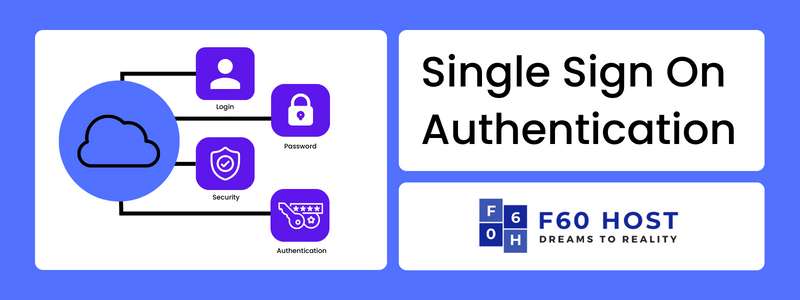How Single Sign On Authentication Can Benefit Your Business

If you’re not familiar with Single sign on authentication or SSO, it’s a technology that allows users to access multiple applications with one set of credentials (usually a username and password). This can be a huge benefit for businesses, as it can streamline the login process for employees and help to keep sensitive data more secure.
What is single sign-on?
SSO is a session and user authentication service that allows a user to access multiple applications with a single set of login credentials, such as a name and password. SSO can be used by enterprises, small businesses, and individuals to simplify the management of multiple usernames and passwords.
An agent module on the application server retrieves specific authentication credentials for an individual user from a dedicated SSO policy server while authenticating the user against a user repository, such as a Lightweight Directory Access Protocol (LDAP) directory, in a basic web SSO service. If you want a detailed explanation of What is Single Sign On? And How Does SSO Work? check out our blog.
How can single sign-on benefit your business?
There are many benefits of SSO. It can help to reduce the number of passwords that employees need to remember, and it can also make it easier to track and manage user access to different applications. Overall, SSO can help to improve security and efficiency for businesses of all sizes.
As the number of applications and devices that employees use for work continues to grow, so does the challenge of managing multiple passwords. Single sign on authentication is a solution that can help businesses manage this password proliferation by allowing users to access all their applications with one set of credentials.
There are many benefits of implementing Single sign on authentication for businesses. Perhaps the most obvious benefit is the convenience it offers employees, who no longer have to remember multiple passwords. This can lead to increased productivity as users spend less time trying to log in to applications. In addition, SSO can also help businesses to improve security by reducing the number of passwords that employees have to remember. With fewer passwords to remember, there is less chance that employees will choose weak or easy-to-guess passwords. We have explained it more here: Top Benefits of Single Sign On(SSO)
Single sign on authentication and security
When you sign in to a website, you’re authorizing the site to access your credentials, such as your username and password.
This process is called single sign-on (SSO). SSO is a security feature that allows you to sign in to websites without having to remember multiple usernames and passwords.
When you sign in to an SSO site, the site first authenticates you with your credentials from another site. This allows you to access all the resources on the SSO site with just one sign-on.
This security feature is important because it helps protect your personal information. It is a process of allowing a user to sign in to a service using only a Single sign on authentication credentials, such as a username and password. SSO can improve user security by eliminating the need to remember multiple credentials.
In addition to security, SSO can also improve user experience by allowing users to sign in to a service without having to enter their login credentials each time. This can save users time and help them focus on the task at hand.
The implementation of SSO can be challenging, however, due to the potential for user authentication vulnerabilities. To ensure the security of SSO systems, it is important to implement measures such as multifactor authentication and session management.
Implementing single sign-on
Single sign-on (SSO) is an authentication method that allows users to access multiple applications with one set of credentials. This can be done by storing and sharing authentication information between applications, or by using a central authentication service.
There are many benefits to implementing SSO, including improved security and usability. However, there are also some challenges that come with SSO, such as integrating with existing systems and managing user accounts. In this article, we’ll discuss the benefits and challenges of SSO so you can decide if it’s right for your organization.
Single sign on authentication process that allows a user to access multiple applications with one set of credentials. This timesaving process simplifies the login process for users and reduces the risk of password fatigue and credential stuffing attacks. SSO can be implemented using a variety of methods, including SAML, OpenID Connect, and OAuth.
Conclusion
Single sign on authentication can benefit your business by reducing password fatigue, increasing security, and simplifying the login process for your employees. If you are considering implementing single sign-on for your business it’s probably the right choice.
There are many benefits that come with implementing a Single Sign-On solution for your business. By allowing users to access all of their applications with one set of credentials, you can reduce frustration, increase productivity, and improve security. Single sign on authentication can also save your business time and money by reducing the number of help desk calls and increasing the efficiency of your IT staff. If you like our blogs you can also follow us on Linkedin at F60 Host and stay connected with the latest updates and blogs.
